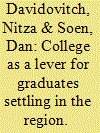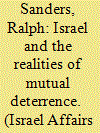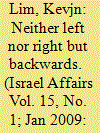|
|
|
Sort Order |
|
|
|
Items / Page
|
|
|
|
|
|
|
| Srl | Item |
| 1 |
ID:
086224


|
|
|
|
|
| Publication |
2009.
|
| Summary/Abstract |
This study examines the degree to which various factors at the College of Judea and Samaria or in the region have had a positive influence on the attitudes of the college's graduates towards the region and to what degree these factors contributed to their decision to settle in the area. In this case study this question has special significance beyond that relevant to the influence of an academic institution on a graduate's decision to settle in the region of his/her college. This special significance stems from the fact that the founding documents defining its goals, which accompanied the establishment of the College of Judea and Samaria (hereafter, CJS), explicitly state that it was the intention of the founders of the College to turn the institution into a tool, which would lead the graduates to settle in the region.1
CJS was established in 1982; in 1990 it moved its academic activities from the settlement of Qedumim to Ari'el. The College was authorized by the Council for Higher Education (CHE) to bestow a bachelor's degree in over 20 departments, divided among five faculties: engineering, architecture, social sciences and humanities, natural sciences, and health sciences. By 2005 over 4,500 graduates had received degrees at CJS. One of the advantages of the College among fellow academic institutions is its closeness to the shoreline and to the centre of Israel. Other advantages of the College in Ari'el are its accessibility by good public transportation and the low cost of living for the students in Ari'el.
|
|
|
|
|
|
|
|
|
|
|
|
|
|
|
|
| 2 |
ID:
086226


|
|
|
|
|
| Publication |
2009.
|
| Summary/Abstract |
In recent years Iran has emerged as Israel's most dangerous enemy. As things stand now, Iran is resisting the call of the United Nations to stop enriching uranium, the material used in making atomic bombs. Israel cannot take for granted Iran's claim that it will use its atomic power only for peaceful purposes. Moreover, the US National Intelligence Estimate of December 2007 that asserted, 'We judge with high confidence that in fall of 2003, Teheran halted its nuclear weapons program', has proved debatable. Experts point out that although Iran's warhead programme may have been stopped, its current uranium enrichment programme still has the potential to produce material for warheads in the future.1 Israel cannot base its policies on the controversial claims of this intelligence report and is attempting to convince the US that Iran is still trying to develop nuclear weapons
Nor can Israel assume that Iran will never launch a destructive first strike against the Jewish state. What can Israel do to avoid a possible Iranian nuclear 'final solution'?
|
|
|
|
|
|
|
|
|
|
|
|
|
|
|
|
| 3 |
ID:
086222


|
|
|
|
|
| Publication |
2009.
|
| Summary/Abstract |
From Hegel to Sartre to Levinas, the 'Other' has populated the pages of philosophy. Gender studies has enlisted the term to denote the manner in which male-dominated culture relates to women. Perhaps most commonly-with Edward Said leading the way-the 'Other' has taken on the meaning of the colonized, the inferior and the alien. The 'Other' has taken its place alongside 'narrative', 'paradigm', 'discourse', multi- and post-most-anything in the de rigueur vocabulary of contemporary social science.
In its common academic sense, 'Others' refer to specific collectives whose characters are clear and delimited-women, homosexuals, ethnic minorities and so on. Being an 'Other' in today's sociological discourse entails belonging to a group with unmistakable traits, a group whose distinct character is the source of the prejudicial treatment it suffers.
|
|
|
|
|
|
|
|
|
|
|
|
|
|
|
|
| 4 |
ID:
086221


|
|
|
|
|
| Publication |
2009.
|
| Summary/Abstract |
Students of Israeli politics will observe that, against the backrop of perpetual siege, the complexity and intensity of fault lines undercutting the nation of six million have become axiomatic- Jew/Arab, Ashkenazi/Sephardi-Mizrahi,religious/secular, left/right, hawk/dove, veteran/immigrant, Zionist/post-Zionist, etc. Yet, Israel has maintained a remarkable degree of stability.
|
|
|
|
|
|
|
|
|
|
|
|
|
|
|
|
| 5 |
ID:
086220


|
|
|
|
|
| Publication |
2009.
|
| Summary/Abstract |
Early in the summer of 1951, reports appeared in the Israeli Yiddish newspaper Letste nayes, published twice a week, and also in the New York daily Jewish Daily Forward, about the condition of Yiddish actors in Israel and their difficult struggle to overcome government policy peohibiting theatre productions in Yiddish. Most conspicuous were articles about the Goldfaden Theatre written by its actors, who presented a grim desvription of their distressing situation.
|
|
|
|
|
|
|
|
|
|
|
|
|
|
|
|
|
|
|
|
|